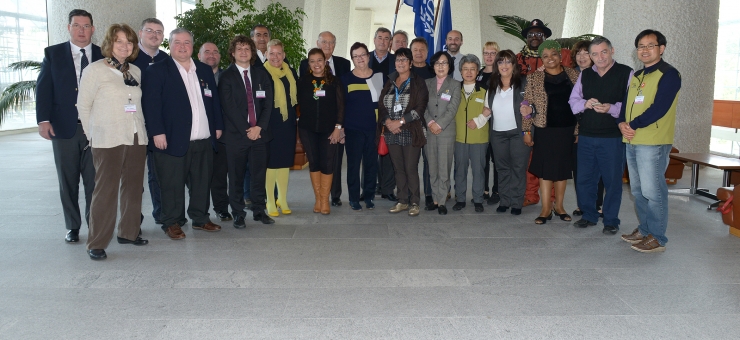UNICARE & PSI at the ILO: winning for union rights

The united workers' group of UNICARE and PSI achieved great success during the ILO tripartite meeting on care last week in Geneva.
UNICARE President Carlos West Ocampo concluded, “We were a strong voice for all workers, no matter whether they are working in the private or the public sector. Thanks to our impact, the government and employer groups agreed, that decent work in the care sector is key to its future"
The final conclusions of the meeting are saying: “Decent work in the health sector is fundamental to ensuring effective and resilient health systems and is a prerequisite to equality in access to health services, good quality health care and productivity in societies."
"Our Job as UNICARE is now to ensure that decent work with strong unions and collective bargaining becomes a reality all over the world.”, summaries West Ocampo the next steps for UNICARE.
UNICARE Director Adrian Durtschi added, “The WHO, UN, ILO and OECD officials told us that there will be needed more than 100 million new jobs in the care sector in the coming decades. UNICARE, together with our affiliates, will make it happen and make sure the joint call for more investment and more collective bargaining for better working conditions becomes a reality.
Durtschi also highlighted the excellent cooperation between UNICARE and PSI, “I especially want to thank Rosa Pavanelli, Chairperson of the workers’ group and General Secretary of PSI, and the whole PSI staff for the great cooperation between UNICARE and them this week. Together we did a great job and showed the importance of unity.”
Right to organise and collective bargaining for all care workers
UNICARE welcomes the statement on social dialogue in the conclusions of the meeting:
“Social dialogue is a key strategy for developing sustainable health sector policies and practices in general, and for improving the working conditions of health workers in particular. Freedom of association and the right to collective bargaining for all health workers need to be promoted in line with the 1998 ILO Declaration on Fundamental Principles and Rights at Work and its Follow-up.”
Frederic Fauvraud, UNICARE Europa President, made the point that: "Just talking about social dialogue is not enough and that UNICARE must strive to make collective bargaining a reality for all health workers. To accomplish that goal it is essential that care workers have the right to organise," he explained.
The President of the Korean Care workers’ union KHMU, Yoo Ji-hyun agreed:
“Collective bargaining is the only way to improve the working conditions in a sustainable manner. We need more collective bargaining on a national level for the whole care sector to increase salaries, improve working conditions, and promote better staffing levels and training. When we are back in Korea, we will use the Joint Declaration on Social dialogue to improve industrial social dialogue”
President of Colombian care union, SINTRASALUDCOL, Luz Fany Zambrano said: “Together with UNICARE we will make this happen. The Colombian government and employers need to stop attacking the unions and adhere to the conclusions of this tripartite meeting by ensuring decent working conditions, freedom of association and strengthen our collective bargaining.”
Better working conditions for Homecare and Long-Term care
SIPTU divisional organizer, Paul Bell said he was pleased that homecare workers were given serious consideration during the ILO meeting.
“Homecare workers were given special attention at the meeting and it was recognized that they deserve better working conditions.”
The joint recommendation of the workers’, governments’ and employers’ groups were a key outcome for UNICARE concerning decent work for care workers and specifically homecare workers, namely:
“(To) undertake a comprehensive study on member States’ national laws and practices and assess if existing ILO programmes, activities and instruments and those from the WHO provide a sufficient framework for ILO constituents to promote decent work for all health workers and what additional guidance is needed, with particular attention to home care and community-based health workers. The study could be the basis for discussion for an ILO Tripartite Experts Meeting.”
Another important outcome for UNICARE is the recommendation “to organize regional tripartite sectoral meetings over the next five years.” This would make it possible to have a meaningful social dialogue on regional level with the right stakeholders to ensure more decent jobs and better collective bargaining.
SIPTU video about the tripartite meeting

